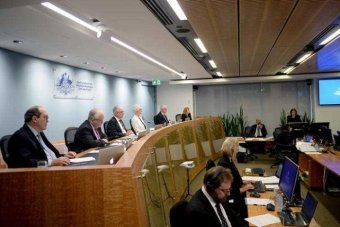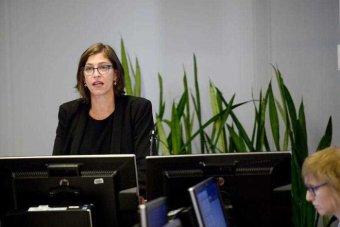Child sex abuse royal commission: Jewish victims 'shunned after making allegations'
ABC
Karen Percy and Jade MacMillan
23 March 2017
 Commissioners listen to evidence during the public hearing in Sydney (photo: AAP/Jeremy Piper).
Commissioners listen to evidence during the public hearing in Sydney (photo: AAP/Jeremy Piper).
Ultra-orthodox Jews believed it was a sin to report allegations of child sexual abuse to the police, and shunned those who did, a royal commission has heard.
Some victims in Melbourne and Sydney said they were subjected to ultra-orthodox interpretations of Jewish laws which made it a sin to give evidence against fellow Jews to secular bodies, like the police.
At least three people, including a rabbi, have been convicted of multiple offences of sexual abuse at Jewish schools or centres.
Melbourne whistleblower Manny Waks has spoken extensively about how he and his family were ostracised when he first went public in 2011.
He was sexually abused by a security guard at the Yeshivah Centre in Melbourne in the 1980s and 1990s.
Seven of Australia's most senior Jewish leaders fronted the Royal Commission into Institutional Responses to Child Sexual Abuse this morning in Sydney.
Anton Block, president of the Executive Council of Australian Jewry, said victims were often shunned after making allegations of child abuse.
"In my view to shun is to be complicit in the abuse that has been perpetrated on the victim and there is no place for that in our society whatsoever," he said.
"These matters must be referred to the police as soon as they are brought to anyone's attention."
Today marked the start of the 53rd public hearing of the royal commission, which is in its fourth year.
This hearing will centre on the current policies and procedures of Yeshivah Melbourne and Yeshiva Bondi,which are part of the Chabad-Lubavitch movement of Judaism, an ultra-orthodox branch of the religion.
Some victims in Melbourne and Sydney said they were subjected to ultra-orthodox interpretations of Jewish laws which made it a sin to give evidence against fellow Jews to secular bodies, like the police.
At least three people, including a rabbi, have been convicted of multiple offences of sexual abuse at Jewish schools or centres.
Melbourne whistleblower Manny Waks has spoken extensively about how he and his family were ostracised when he first went public in 2011.
He was sexually abused by a security guard at the Yeshivah Centre in Melbourne in the 1980s and 1990s.
Seven of Australia's most senior Jewish leaders fronted the Royal Commission into Institutional Responses to Child Sexual Abuse this morning in Sydney.
Anton Block, president of the Executive Council of Australian Jewry, said victims were often shunned after making allegations of child abuse.
"In my view to shun is to be complicit in the abuse that has been perpetrated on the victim and there is no place for that in our society whatsoever," he said.
"These matters must be referred to the police as soon as they are brought to anyone's attention."
Today marked the start of the 53rd public hearing of the royal commission, which is in its fourth year.
This hearing will centre on the current policies and procedures of Yeshivah Melbourne and Yeshiva Bondi,which are part of the Chabad-Lubavitch movement of Judaism, an ultra-orthodox branch of the religion.
 Counsel assisting Naomi Sharp said many families experienced severe ostracism (Photo: AAP/Jeremy Piper).
Counsel assisting Naomi Sharp said many families experienced severe ostracism (Photo: AAP/Jeremy Piper).
Alleging abuse was 'unlawful gossip'
Counsel assisting Naomi Sharp said the commission was told the hearing would examine how principles of Jewish law were now being applied to child sexual abuse allegations.
"The royal commission found there was considerable evidence that some members of the Chabad-Lubavitch community in both Melbourne and Sydney believed that alleging another Jewish person may have sexually abused a child is engaging in 'loshon horo', unlawful gossip, and that such conduct is against Jewish law," she said.
"In some cases victims and their families experienced such severe ostracism and shunning that they felt unable to remain in their community."
The leaders conceded they were naive about child abuse and Rabbi Moshe Gutnick, from Sydney Beth Din, admitted he did not hear of any cases until 2011.
"We were very naive," he said.
"We are a very small community and because we are small in numbers, even if there's a case of abuse, there's one or two whereas in the Catholic Church they had a hundred so there was something that set alarm bells going."
More needs to be done to protect children, rabbis admit
Rabbis at the Melbourne and Sydney centres admitted further work needed to be done to provide greater protection for children.
Yeshiva Bondi just last month submitted documentation saying it was satisfied with the measures in place to protect children.
But under questioning, Rabbi Pinchus Feldman admitted the centre had made changes in the past few days in anticipation of Thursday's hearing.
He also said greater protections were still needed, especially surrounding the onsite bath house, where adults and children bathed together.
"If there was some more than was needed for me to do, I apologise," he said.
Counsel assisting the commission Naomi Sharp accused Rabbi Feldman of dropping the ball on child protection.
"You have no idea what is in the Chabad Youth Child Protection Policy," Ms Sharp said.
"I will not be able to respond to every detail," Rabbi Pinchus responded.
Melbourne Rabbi Chaim Tsvi Groner also said he would welcome advice to put further measures in place to ensure child safety.
Rabbi Groner was forced to defend a short redress scheme offered by Yeshivah Melbourne, which ran for just 13 months.
The scheme began in 2015 and wrapped up late last year, dealing with 10 victims.
He said he had taken the commission's suggestions on board when establishing the scheme, but the commission recommended that such schemes be open ended.
When questioned by Ms Sharp, Rabbi Groner said he would re-examine the scheme.
Rabbi Feldman was asked why he had not undertaken a similar scheme in Bondi.
He said he had apologised to victims but maintained abuse did not occur at the new entity, Yeshiva Centre, and it was not responsible financially.
Originally published at ABC.
Counsel assisting Naomi Sharp said the commission was told the hearing would examine how principles of Jewish law were now being applied to child sexual abuse allegations.
"The royal commission found there was considerable evidence that some members of the Chabad-Lubavitch community in both Melbourne and Sydney believed that alleging another Jewish person may have sexually abused a child is engaging in 'loshon horo', unlawful gossip, and that such conduct is against Jewish law," she said.
"In some cases victims and their families experienced such severe ostracism and shunning that they felt unable to remain in their community."
The leaders conceded they were naive about child abuse and Rabbi Moshe Gutnick, from Sydney Beth Din, admitted he did not hear of any cases until 2011.
"We were very naive," he said.
"We are a very small community and because we are small in numbers, even if there's a case of abuse, there's one or two whereas in the Catholic Church they had a hundred so there was something that set alarm bells going."
More needs to be done to protect children, rabbis admit
Rabbis at the Melbourne and Sydney centres admitted further work needed to be done to provide greater protection for children.
Yeshiva Bondi just last month submitted documentation saying it was satisfied with the measures in place to protect children.
But under questioning, Rabbi Pinchus Feldman admitted the centre had made changes in the past few days in anticipation of Thursday's hearing.
He also said greater protections were still needed, especially surrounding the onsite bath house, where adults and children bathed together.
"If there was some more than was needed for me to do, I apologise," he said.
Counsel assisting the commission Naomi Sharp accused Rabbi Feldman of dropping the ball on child protection.
"You have no idea what is in the Chabad Youth Child Protection Policy," Ms Sharp said.
"I will not be able to respond to every detail," Rabbi Pinchus responded.
Melbourne Rabbi Chaim Tsvi Groner also said he would welcome advice to put further measures in place to ensure child safety.
Rabbi Groner was forced to defend a short redress scheme offered by Yeshivah Melbourne, which ran for just 13 months.
The scheme began in 2015 and wrapped up late last year, dealing with 10 victims.
He said he had taken the commission's suggestions on board when establishing the scheme, but the commission recommended that such schemes be open ended.
When questioned by Ms Sharp, Rabbi Groner said he would re-examine the scheme.
Rabbi Feldman was asked why he had not undertaken a similar scheme in Bondi.
He said he had apologised to victims but maintained abuse did not occur at the new entity, Yeshiva Centre, and it was not responsible financially.
Originally published at ABC.